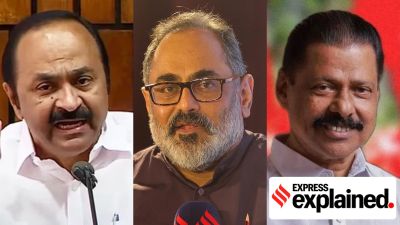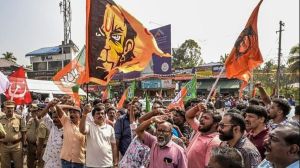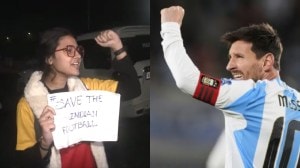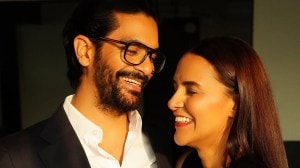Teen Murti: Nostalgia for ivory tower and a question of standards
Why have 57 historians signed a petition calling for the renewal of the Nehru Memorial....
Why have 57 historians signed a petition calling for the renewal of the Nehru Memorial?
Discovering that is all-important because of the apparent political and personal diversity of the petitioners. They may stand together now,but one,Harvards Sugata Bose famously accused another,Ramachandra Guha,in this newspaper of being carried away in starry-eyed admiration of Nehru; a third,Nivedita Menon,described Guhas analysis of 1950s legislation as simple,feel-good,nationalist telling that is trite,conventional and utterly misleading.
While Guha called Indian historians in the US,who compose over a third of the signatories,diasporic South Asians…whose penchant for posturing and
jargon-mongering greatly exceeds their capacity
for independent and original research.
These words only partially express deep divides in political orientation between those who favour mainstream histories,those who privilege the stories of others,such as Subhash Bose or Bhagat Singh,and those who focus on peasants and womens contributions. So,when a group of scholars who seem so diverse attack a major centre of learning for lacking diversity,it is impossible to ignore.
But,while divided on politics,they have one thing in common: as young historians,they were star-struck by old NMML; and,since then,they have been in and out of the best institutions of the world. Which is puzzling,says CSDSs Madhu Kishwar in a letter to the Culture Ministry.
The NMML she recalls from the 1980s,she says,had no photocopying,slow responses to microfilming,and ill-trained staff.
That some resources for scholars are considerably better is a repeated refrain from many of the younger researchers and regular library users The Indian Express interviewed: from usable bathrooms and working air-conditioning to larger questions about scanning and ordering of books.
(No younger scholar was willing to go on the record; either way,they said,you could antagonise powerful academics.)
Yet the work was world-class,say the petitioners. Aijaz Ahmads In Theory on postcolonial literature,and Sumit Sarkars Writing Social History were based in part on lectures at NMML. Both became classics.
Where are such lectures now,they ask; certainly,no such books have been produced.
In their recollection,seminars were more inspiring,talks more erudite. But others respond that seminars in an unglobalised India were the primary mechanism of knowledge transfer,and now they arent. And in a post-internet world,there are other methods of getting research out.
Comparing highly cited books of history published since 2000 and those in the 1980s is illustrative: the latter were largely prefaced by lecture series,the former werent. Indeed,several signatories couldnt recall when and where,anywhere in the world,they recently attended a seminar of the quality they remembered at the NMML.
Still,diversity disciplinary,ideological,methodological,and generational has suffered,they say.
The charge of stifling ideological diversity angers director Mridula Mukherjee. I have striven all my life to promote a liberal atmosphere,she says,pointing out that under her auspices the NMML took up Bhagat Singh in a big way,something earlier unthinkable in mainstream versions of the freedom movement,such as she herself is associated with.
And under her,progress on the collected works of Jayaprakash Narayan continued,she says,with four more volumes out.
Her critics arent quite able to point to obvious gaps in invitees or research agendas for political reasons; but then historians detest counterfactual questions.
Mukherjee has collected a large number of scholars who have written,publicly and privately,in her support.
Some,like Irfan Habib of AMU and Madan Gopal Singh of Delhi University,wrote individual letters; but D N Jha,the former head of Delhi Universitys history department,collected over 75 scholars in a counter-petition.
And while the locations on Guhas petition are Cambridge,New York,Los Angeles,Jhas has Varanasi,Ranchi,Tiruchirapalli,and scholars who used the NMML more recently.
Talk to some of them,and they seem to think it remains a cut above everywhere else.
More recent NMML fellows,too,tend to have a different perspective from those who left earlier. And among Mukherjees supporters are those who agree with her that its a museum first,with environmentalist Pradeep Kishen saying that her conservation is exemplary,and heads of NGOs and schools complimenting her for creating programmes that contextualise current policy issues and draw in children.
So is it just a difference in focus? (We already have a Bal Bhavan in Delhi,said one opponent.) A narrowing of focus need not be a decline in liberalism.
Two of the reforms the signatories want: a transparent selection panel,and more academics in charge,might help counter charges of illiberalism.
But the fourth,to restore the NMML to pre-eminence,is an outcome,not a process. One young social scientist using the library put it thus: even if the NMML was a centre of excellence in the past,that doesnt mean its the most efficient location in the future.
Is the petition,in his words,an exercise in nostalgia,to which historians are prone? Responded a petitioner: The default Indian position. When an institution declines,its best to start afresh.
The petitions are all addressed to the PM but theres no doubt of their eventual target. Will it,like so many other cultural institutions,continue to be a Nehru-Gandhi jagir,asks Rukun Advani,handed out to the loyal? That decision will effectively be the UPA chairpersons (Sonia Gandhis).
Next month,as Mukherjees term ends,whether she gets an extension and who replaces her if she doesnt will signal whos won the first round in the UPAs bitter intellectual family feud.
- 01
- 02
- 03
- 04
- 05






























